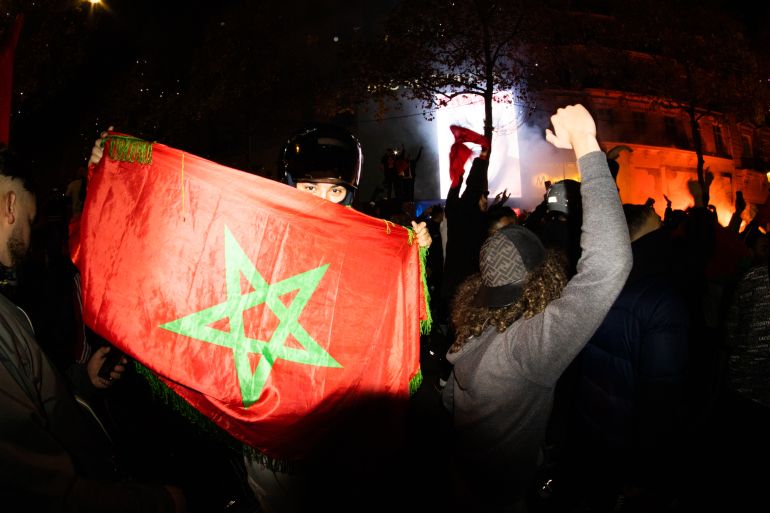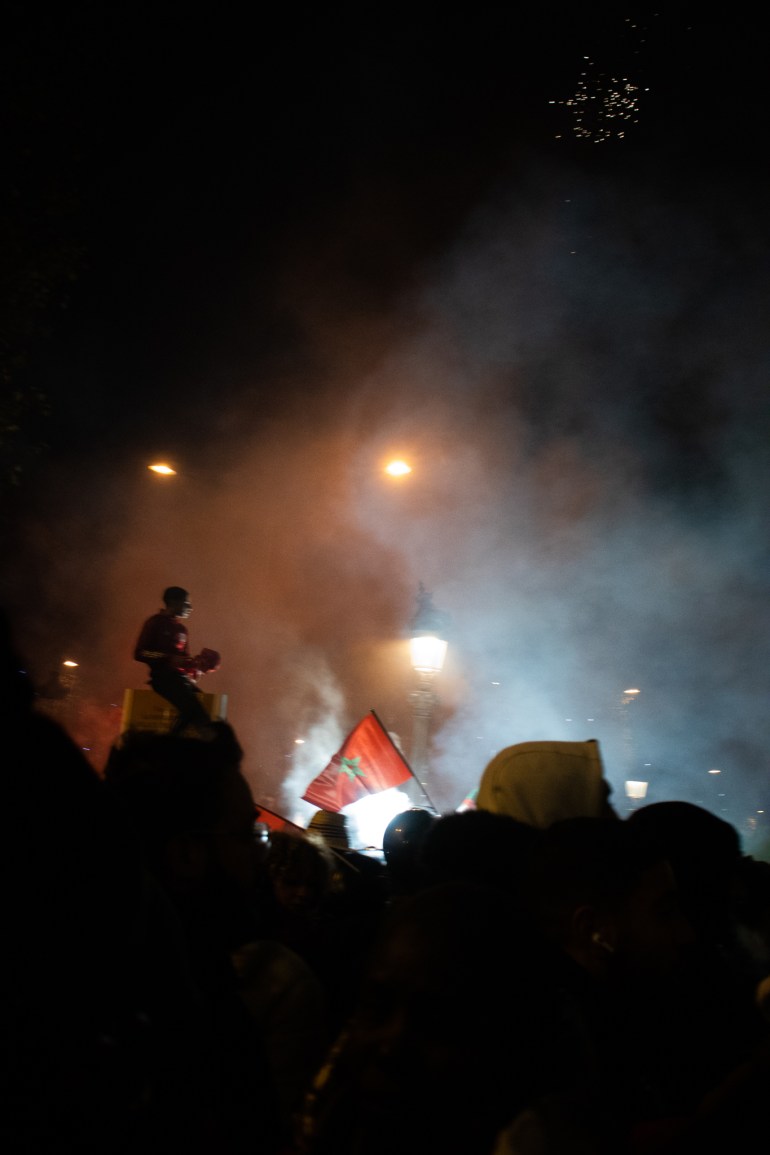Fears of trouble in Paris ahead of Morocco-France World Cup game
Moroccan celebrations have lit up capitals around the world, but in Western Europe, attempts to constrain them have been met with violence.

There are few more magical places than Paris in the wintertime.
Christmas markets and ice rinks draw the masses, while crepe stands provide what feels like warm hugs for the tongue. The city of love’s festive season is always lucrative as millions of tourists from around the world descend on the French capital.
Keep reading
list of 3 itemsThe story of Yassine Bounou, Morocco’s smiling World Cup hero
Underdog Morocco face French favourites for World Cup final spot
This year, however, the 2022 FIFA World Cup has interrupted regular scheduled programming. As France prepares to play Morocco in the second semifinal of the tournament, central Paris is preparing to batten down the hatches.
The French interior minister, Gerald Darmanin, has announced that the city would be mobilising 10,000 police officers – half of them solely dedicated to guarding the Champs Elysees, in what his ministry has called crowd control and terrorism prevention operations.
The drastic measures are anticipatory after the incidents that transpired following Morocco’s historic victory against Portugal in the World Cup quarterfinals.
In many large cities around the world, spontaneous celebrations erupted in good-natured fun.
Moroccan rapper French Montana led an impromptu party in the heart of New York’s Times Square. Montreal’s North African district along Jean-Talon Street was flooded with Moroccan flags, emerald smoke bombs, music and dance. As has become habit, Doha’s Souq Waqif was the place fans finished their World Cup evenings before calling it a night.
The Parisian celebration, however, was ugly. Heavily equipped police officers clashed with some of the 20,000 supporters who congregated along the Champs Elysees. Tear gas was deployed and approximately 100 people were arrested on various charges, according to the French interior ministry.
In France, this has become an unwelcome tradition whenever a North African national football team plays an important match in a notable international competition, leading many to question the reason for the disparity between the tensions felt in Paris and other Western European cities, and those elsewhere.
Mahfoud Amara, a professor at Qatar University, and author of Sport, Politics and Society in the Arab World, believes that the cause is the heavy-handedness of the authorities.
“The security apparatus in countries like France, Belgium reacts to supporters from the Maghreb [western North Africa] celebrating a football match as if it’s a security threat,” Amara told Al Jazeera. “They assume that large numbers will automatically translate to be trouble. Therefore, they need to be controlled and kept away from the city centres. That instinct to constrain the celebrations can quickly turn to tension.”

‘Racial discrimination’
Sarah, a French-Moroccan visual artist who did not wish to give her real name, attended the celebrations in central Paris, which quickly degenerated.
“Initially, there was a warm, jovial atmosphere,” she recounted.
“Everyone was so excited. Of course, there were a lot of young people, but also families and children. I was there alone with my camera, but never feared for my safety. Then the police blocked a road and gassed us. One lady fell down and people were helping her up. It was chaos.”
Before the game, the Paris Police Prefecture said it was “putting in place a security disposition to fight against delinquency and assure the security of people and property in Paris”.
However, Sarah noted that she did not recall seeing any skirmishes when the security presence was weaker after Morocco triumphed over Spain in the World Cup round of 16 a few days prior.
Earlier this year French public authorities, and Darmanin in particular, were severely criticised for how crowds were managed during May’s UEFA Champions League final between Real Madrid and Liverpool.
Kickoff was delayed by a total of 36 minutes due to a large number of fans outside of the stadium unable to gain access to the ground, despite many showing up with a ticket in hand in the vicinity of the Stade de France in Saint-Denis, a Parisian suburb.
In the immediate aftermath, Darmanin asserted that, “between 35,000 and 40,000 supporters without tickets, or with counterfeit tickets, were present around the Stade de France”. That statement was contradicted by many journalists who attended, as well as fact checkers.
Despite criticism of the approach of security forces, Darmanin refused to apologise for anything apart from “the disproportionate use of tear gas” and said that “if there is something that went wrong at the Stade de France, it is the fight against delinquency”.
That ignored the criticisms related to the lack of crowd control to and from public transport stations and the use of pepper spray against fans.
For Rim-Sarah Alouane, a French legal scholar and a PhD candidate at the University Toulouse-Capitole, the policing structures in place are failing to protect the people they are supposed to serve.
“There are many reports about the horrific issue of racial profiling from French police. For some in certain demographics, French cops can even be perceived as a threat. There is no relationship of trust – that was broken a long time ago,” Alouane told Al Jazeera.
Throughout working-class neighbourhoods in France, it is common to see random “stop-and-frisk” searches of visible minorities. In that sense, police are often preemptively positioned as adversarial entities for many young French people of North African descent.
The French government has made some efforts in the past to address racial discrimination by the police, such as establishing a website that allows citizens to be consulted on the topic, but critics say these steps do not go far enough.
Like Sarah, Yassine, a 30-year-old Algerian supporter, also made his way to the Champs Elysees, although he was more of a passive observer than a supporter. When he saw how tense the atmosphere had become, he quickly returned home.
“My theory is that there are some supporters that feel like fighting with the police is like a symbolic revenge against the violence of daily life. Things like police identification stops, the feeling of being discriminated against, common political discourse against immigrants and Islam, etc,” Yassine explained.
Despite the likelihood of violence, Sarah still plans on celebrating with her compatriots if Morocco can upset the reigning world champions and advance to a World Cup final.
“I plan on going out and I will. I am aware of the risks, but for me, they don’t stand up to the joy of a potential victory. I want to continue witnessing history and celebrate it with all those who share this pride and joy.”